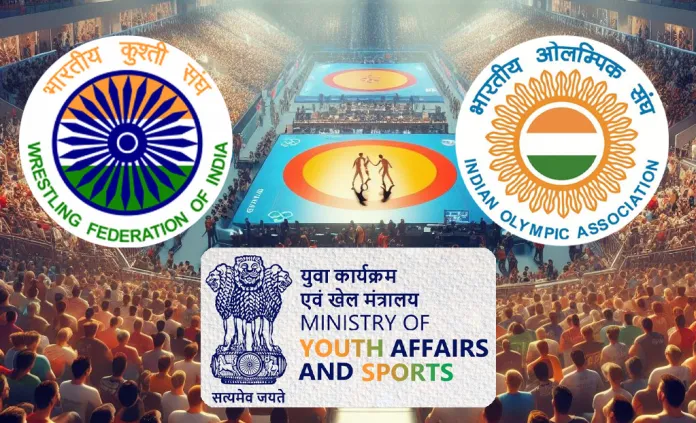Description

Copyright infringement not intended
Picture Courtesy: www.opindia.com
Context: The Indian government, through the Ministry of Youth Affairs and Sports, has taken significant steps concerning the Wrestling Federation of India (WFI).
Key Highlights
- The government has asked the Indian Olympic Association (IOA) to form an Ad-Hoc Committee to oversee and manage the affairs of the Wrestling Federation of India. This move aims to address concerns about the governance and control of the federation.
- The ministry suspended the newly elected Executive Committee of the WFI due to alleged disregard for procedural norms and the organization's constitution. Specifically, concerns were raised regarding the announcement of national tournaments without adhering to proper protocols.
- The government emphasizes the need for stringent corrective measures to uphold the principles of good governance within sports organizations, highlighting the influence and control of former office bearers within the WFI.
Significance
- The government is prioritizing adherence to procedural norms and governance standards within sports bodies like the WFI to ensure fair and transparent operations.
- The emphasis on preventing any negative impact on wrestlers and stakeholders underscores the importance of maintaining stability and support for athletes even amid administrative changes.
- The IOA's involvement in forming an Ad-Hoc Committee and managing the interim affairs reflects the broader oversight role of higher sports bodies in maintaining the integrity of national sports federations.
|
Overall, this situation demonstrates the government's commitment to ensuring proper governance and adherence to established norms within sports organizations, specifically focusing on the wrestling discipline to safeguard the interests of athletes and stakeholders involved.
|

Ad-hoc committee
- An ad-hoc committee is a temporary group of people who are appointed to deal with a specific issue or task. They are usually formed when a regular committee or board is unable to handle the matter, or when there is an urgent need for action. They have a clear mandate and a defined timeline, and they dissolve once they have completed their work.
- Ad-hoc committees can be useful for addressing complex or controversial problems that require specialized expertise or input from various stakeholders. They can also help to avoid delays or conflicts that might arise in a larger or more permanent body.
Ad-hoc committees also have some drawbacks
- They may lack accountability or transparency, as they are not subject to the same rules or oversight as regular committees.
- They may create duplication or confusion, as they may overlap with the functions or responsibilities of existing committees or departments.
- They may be inefficient or ineffective, as they may have limited resources, authority, or support from the organization or the public.
Some situations where ad-hoc committees might be appropriate are:
- A crisis or emergency that requires immediate action and coordination among different parties.
- A novel or complex issue that requires specialized knowledge or skills that are not available in the regular committee structure.
- A sensitive or controversial issue that requires consultation or participation from diverse or marginalized groups that are not adequately represented in the regular committee structure.

Conclusion
- An ad-hoc committee is a temporary and flexible way of dealing with a specific issue or task that cannot be handled by a regular committee or board. It has advantages and disadvantages, and it should be used with caution and care.
|
PRACTICE QUESTION
Case Study:
XYZ Corporation, a global company, has recognized the need to enhance workplace diversity and inclusivity. To address this, the CEO has formed an ad-hoc committee tasked with developing strategies to promote diversity and inclusivity within the organization.
Q 1: What is the primary characteristic of an ad-hoc committee?
A) Permanent existence
B) Temporary Existence
C) Hierarchical structure
D) Operational decision-making
Answer: B
Explanation:
An ad-hoc committee is formed for a specific purpose and has a temporary existence. Once its task is completed, the committee is dissolved. Ad-hoc committees are created to address specific issues or projects and are not meant to be permanent.
|















